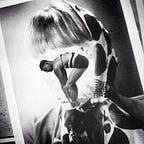My Brilliant Friend is the TV adaptation masterpiece I didn’t know I was wishing for.
I don’t know. I never felt like this about a TV show. Much less a novel adaptation for the screen. So I feel compelled to be amused. My first time reading Elena Ferrante was when I was separated from my husband of 6 years. We almost divorced. We came close to collapsing. But we worked it thru. It lasted a whole Summer, I only say this because it took me on a journey no man on Earth could hear it without going mad, but that’s another story, and this time in my life also led me to Elena Ferrante.
During that time, I was crashing and being taken under the roof of two beautiful friends of mine who questioned nothing and only gave their generous time and space for me to pull the self together. I also remember being awake and asleep all at the same time. It was a time I was utterly confused by the sudden appearance of a familiar feeling that I hated where I was and I wanted out. Again. I was confused in a muted way, like inside of a Cathedral. Full of shadows, corners, secrets. I could not recognize the faces of those I was with at the time. I could not recognize my friends. My husband. My family. My life.
For most of my life I wanted out. As a teenager my father’s best friend told me I had to leave that place I was born. My grandmother told me. My grandfather told me. And I even heard once from a street corner mystic. My entire childhood was like waiting for the ride that would take me away from that place. That place I loved to hate and hated to love. The thing they never bothered to answer me is … “go where?” — I was brought up in an isolating and alienating community in the Brazilian rural area where there was not a library or a movie theatre in sight.
I did leave. Many times, over and over. I saw more of the “outside” than my grandmother and mother will ever dream of. But leaving is a feeling that keeps coming back to a rhythm rooted very deeply in me. I could not believe that there it was. Again. The friend I was staying with gave me a copy of Elena Ferrante’s novel The Days Of Abandonment, and said “I think you’re going to need this.” It’s a novel that tells the story of Olga, a middle-aged wife and mother, who is plunged into a breakdown after her husband leaves her for a younger woman and her rage and self-pity threaten to turn her into something of a monster.
“Going through one of those moments that you read about in books, when a character reacts in an unexpectedly extreme way to the normal discontents of living.”
― Elena Ferrante, The Days of Abandonment
I absolutely loved it. Of course, breakdowns and monsters. The female turning sour. I read it in its entirety by the pool of another friend, who was also housing me and taking care of my cat, and who was quick to declare his love for me when he found out I was possibly getting a divorce. The situation couldn’t have been more or less strange if you didn’t know me.
I keep hidden what needs to be hidden, but that’s only because I come from a place you only dream of a world you never saw. So I don’t keep on wishing for what is enough. It was as if I was living a life full and that I thought I wanted it but I didn’t have anyone to report to. And that I was somehow missing what the world was like back where I came from. As if I had to look after it.
This dissonance to redemption in the world that you leave behind in Ferrante’s novels and most importanly in the new HBO series adaptation of her novel My Brilliant Friend, is what I didn’t know I was wishing for. I suddenly doubled over on my couch, next to the husband of more than 6 years now, over the ending of episode 6, in wanting to know more about crushing butterflies between my fingers, and I felt no need to understand in order to accept things. And the things I have done to surrender. And to find myself walking again.
Not to mention the beauty of its entire production, My Brilliant Friend is the show about humanity and our feelings beyond thought. Like perceiving a crooked reality thru an obtuse cut. I call it masterful, because it is, and I don’t care who says otherwise.
The story reminds you of things that crush you but also about what matters. Because it matters to say you care. Because it matters to go too far in order to be. Because it matters to accept with humility. Because it matters to question “who is that in me?”. Because it matters to walk blindfolded up to the edge of your dream. Because it matters to experience the fall and get up again. Because it matters to dare to think.
And most importantly, it reminds me that the best of me is when it matters that I know nothing. Because I suddenly see that I know nothing.
And I wish for that.
